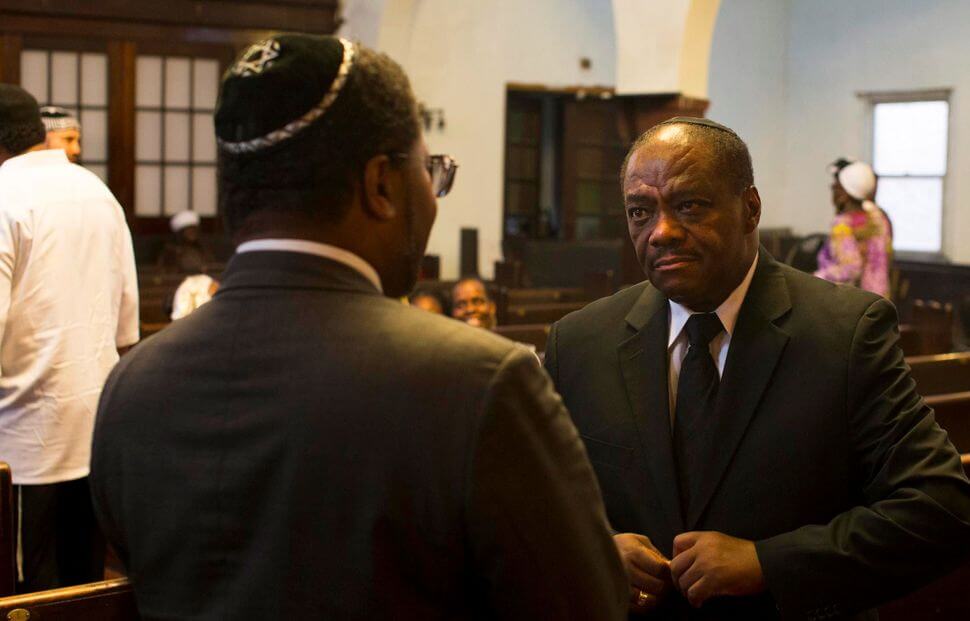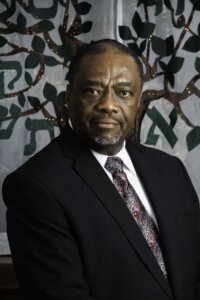For an Israelite chief rabbi, a ‘mess’ of Kanye’s making
Rabbi Capers Funnye leads the largest Israelite movement in the United States. He’s tired of people conflating it with extremists

Rabbi Capers Funnye (right) leads Beth Shalom B’Nai Zaken, an Israelite congregation in Chicago he described as “Conservadox.” Photo by Claudio Papapietro
The furor around antisemitic diatribes from Kanye West and a conspiracy-filled movie shared by Kyrie Irving has made it a long month for Rabbi Capers Funnye.
Funnye, 70, heads the International Israelite Board of Rabbis, which has meant he has been asked to explain, again and again, that the affiliated movement — the Commandment Keepers — has nothing to do with the antisemites it’s regularly inappropriately lumped in with.
The Commandment Keepers were founded in 1919 by Rabbi Wentworth Arthur Matthew, a Caribbean immigrant who preached that African Americans were descended from the Israelites of the Torah. A century later, it is one of an array of religious movements whose followers hold that belief — seemingly alluded to by both Irving and West in recent weeks.
Those movements are often grouped together under one label — “Black Hebrew Israelites” — but while many trace their origins back to Rabbi Matthew, the differences between them today are stark. Funnye’s organization, which serves about 2,500 people in the United States, is acknowledged by local mainstream Jewish organizations, and Funnye himself, who leads a thriving Chicago synagogue, sits on the Chicago Board of Rabbis.
Some other Israelite groups, however, deify Jesus Christ, and several have called white Jews impostors. The Anti-Defamation League has categorized at least seven of the groups as extremist. The Southern Poverty Law Center has created a separate designation, Radical Hebrew Israelites, for groups that “appropriate biblical Jewish heritage to claim an exclusive identity as the true chosen people of God.”
The tendency to conflate them was a thorn in Funnye’s side long before West — who changed his legal name to Ye — tweeted his plan to go “death con 3” on Jewish people, then declared that he coudn’t be antisemitic because “Black people are actually Jew also.”
“I don’t know what the hell that means,” Funnye said in an interview. “I don’t know what group he’s a part of, I don’t know what group he identifies with.
“For me,” he added, “all he’s doing is making a mess for the International Israelite Board of Rabbis.”
Funnye said his movement recognizes Ashkenazi, Sephardic and other Jews and that his synagogue, Beth Shalom B’Nai Zaken Ethiopian Hebrew Congregation, has about 200 member-families and is “Conservadox,” with seating for prayer segregated by gender, but technology like microphones used on Shabbat.
I spoke to Funnye by phone Friday about the conflation of Israelite groups and why he thinks the ADL isn’t helping. Our conversation has been edited for length and clarity.

There’s been some confusion around terminology. Can someone say that you and the congregation you lead are Israelites?
Yes. We are Israelites — not Black Israelites, Israelites. Israelites can be a wide range.
What do you think about the Israelite groups whose beliefs and street-preaching antagonize Jews?
They are not a part of our community in any way, shape, form or fashion. We do not support anyone that espouses racism, antisemitism or any of the other phobias. That is not who the International Israelite Board of Rabbis is. And I say that as the chief rabbi.
Are you growing weary of explaining the difference to people?
Very much so. As a matter of fact, I was in New York recently and spoke to some of my rabbinic colleagues on the New York Board of Rabbis, and I said, if you have the ADL engaging with Kyrie Irving, the optics would be much better if members of our community were present with you. You’re not the only Jews. Some Jews are white, but not all.
But some street-preaching groups also identify themselves as Israelites, and share the belief that some Black people are descended from the Jews of antiquity. Where does your group split from theirs?
Here’s the question: If they’re saying that they’re ancient and connected to the House of Israel, how do they ascertain that connection? In what manner are they connected? What processes have they undergone to establish their connection? The individuals that are members of our congregation who were not born Jews have gone through the process of conversion to the Jewish faith. Period.
We cannot control what any other group calls themselves. But we can control other people’s understanding of who we are. Whatever these other groups call themselves — well, this is America. But they don’t share anything with us. I don’t know them.
What do you make of Kanye West saying he can’t be antisemitic because “Black people are actually Jew also?”
When this man says he’s going “death con 3” on Jews, I don’t know what the hell that means. I don’t know what group he’s a part of. I don’t know what group he identifies with. All I know is I’ve seen him with President Trump a few times.
So, relative to his saying that he can’t be antisemitic, I said it a few weeks ago in a drasha [sermon]: Semitic is more than an ethnicity — it’s a cultural identity. You can be antisemitic against me because culturally, I identify as a Jew — ani yehudi. Period. So getting into who is or isn’t, that’s neither here or there for me.
I’ve never listened to his music. All I can say is, he has some issues. Issues of understanding. He does not have a deep knowledge base at all, from what I’ve read in the paper. So Kanye is doing his thing, and for me, all he’s doing is making a mess for the International Israelite Board of Rabbis.
Tell me more about that mess.
The mess is, he wants to say who he is, but what group does he belong to? You can’t just say, I’m a Jew. How? What process? There is a process. There was a process at Mount Sinai. The people had to immerse in a mikvah, change their clothes, before they stood at Mount Sinai.
So, what mikvah did he go to? Who performed his brit milah? Was he already circumcised?
All we want to have is qualifiers, so that people don’t take a coat of paint and painting everybody who says they’re Israelite as extremist or antisemitic.
What about Kyrie Irving, the NBA star who tweeted a link to a documentary filled with antisemitic conspiracy theories and then said, “I cannot be antisemitic if I know where I come from,” before eventually apologizing. What would you want to say to him?
I would have to hear what Kyrie has to say first. And then I would respond to Kyrie. And then I would do my best to explain to him the diversity of the ethnicities within the Jewish community.





















